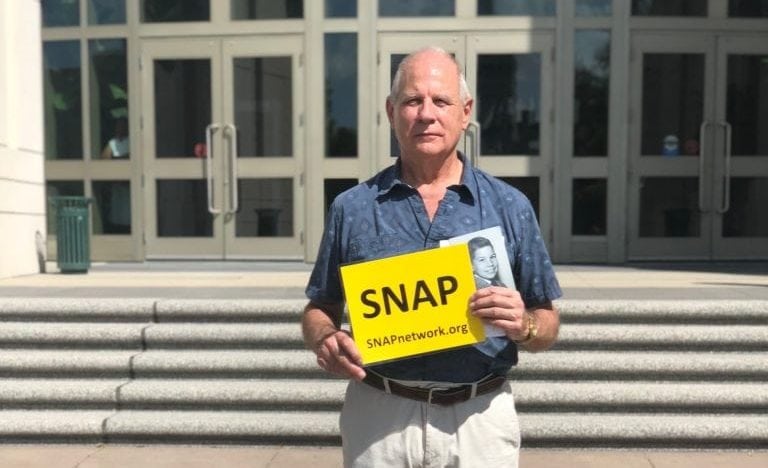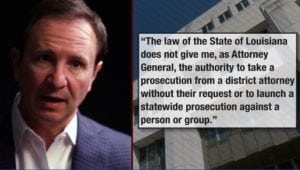The Survivors Network for those Abused by Priests (SNAP) is continuing to call on Louisiana Attorney General Jeff Landry to initiate a statewide investigation of the Catholic Church.
“It’s needed,” said Tim Lennon, president of SNAP. Friday morning, Lennon stood outside the attorney general’s office in Baton Rouge holding a SNAP sign, and black and white childhood photo of himself. Lennon is survivor of priest sex abuse.

“When I was abused at 12, I froze,” said Lennon. “I didn’t say anything, I didn’t tell anyone, but now I’m able to fight back.”
SNAP has been emboldened by this summer’s grand jury report in Pennsylvania that uncovered 300 priests had abused more than 1,000 children over decades.
Citing Bishop Accountability, SNAP says 78 Catholic priests across Louisiana have been accused of molesting children, including 25 in the Diocese of Lafayette.
“What happened in Pennsylvania happens in Louisiana,” Lennon said.
SNAP is also calling for a professionally staffed hotline in Louisiana, so victims can report cases of clergy abuse.
Attorney General Responds
Attorney General Jeff Landry was not available for an interview Friday. In the past, Landry’s office has said his office does not have jurisdiction to launch an investigation similar to what happened in Pennsylvania. His office, issued the following statement about Friday’s protest:

“Today, we welcomed a group of men and women to our office who came to have their voices heard. I share their passionate cry to bring child predators to justice. As a father and as Attorney General, the safety of our children is one of my greatest priorities. Whether sexual abuse is committed by a member of the clergy, a school official, a first responder, or a family member, crimes against children should not be tolerated. I highly encourage victims to report any potential crime to the law enforcement office and district attorney in the city or parish where the potential crime took place. It is important to note and remember that law enforcement cannot investigate a potential crime until they have received a complaint of criminal activity. The law of the State of Louisiana does not give me, as Attorney General, the authority to take a prosecution from a district attorney without their request or to launch a statewide prosecution against a person or group. Though the law may prohibit me from doing those things, I have instructed my office to assist in any investigation or prosecution done by local law enforcement if assistance is requested of us. As Attorney General, I offer my full commitment to doing all I legally can to rule out all types of criminal activity.”
“My reaction is to be creative,” said Lennon. “In some states, we know there can’t be a grand jury like Pennsylvania, but we can do something like New York, where there’s a partnership between the local district attorney and the attorney general of the state.”
Grand jury laws differ
Louisiana’s Code of Criminal Procedure states the the grand jury “is an accusatory body and not a censor of public morals. It shall make no report or recommendation, other than to” return a true or not true bill that a crime was committed or by abandoning the investigation.
In contrast, Pennsylvania law allows for investigating grand juries, like the one that dug into the dioceses there. Those grand juries are allowed “to identify, criticize and implicate people who have not been charged with crimes,” according to a recent report from the Pittsburgh Post-Gazette:

